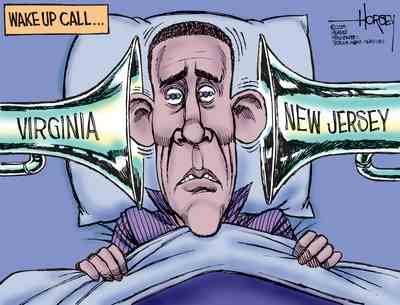- MENU
- HOME
- SEARCH
- WORLD
- MAIN
- AFRICA
- ASIA
- BALKANS
- EUROPE
- LATIN AMERICA
- MIDDLE EAST
- United Kingdom
- United States
- Argentina
- Australia
- Austria
- Benelux
- Brazil
- Canada
- China
- France
- Germany
- Greece
- Hungary
- India
- Indonesia
- Ireland
- Israel
- Italy
- Japan
- Korea
- Mexico
- New Zealand
- Pakistan
- Philippines
- Poland
- Russia
- South Africa
- Spain
- Taiwan
- Turkey
- USA
- BUSINESS
- WEALTH
- STOCKS
- TECH
- HEALTH
- LIFESTYLE
- ENTERTAINMENT
- SPORTS
- RSS
- iHaveNet.com: Politics
by Mary Kate Cary

Obama's Wake-Up Call (© David Horsey)
This year's election results in Virginia and New Jersey sent a clear message: to win elections these days, you have to win the independent vote. According to Politico's tally of the exit polls, Virginia Republican Bob McDonnell captured 62 percent of the independent vote, while Democrat Creigh Deeds received only 37 percent. New Jersey's new governor, Republican Chris Christie, won 58 percent of the independent vote, while incumbent Democrat Jon Corzine received only 31 percent.
This is in line with a poll that Gallup released last week showing that Americans are more than twice as likely to choose "conservative" as "liberal" in identifying themselves. When you add moderates to the picture, conservatives and moderates outnumbered liberals by nearly 4 to 1.
The conservative figure has inched up as moderates have moved to the right, both in general ideology and on specific issues. Great for the
Here's why: If you look at the specific issues on which Gallup polled, you'll see Americans leaning right on fiscal concerns. More folks are concerned about overregulation of business these days, for example, and record-high numbers think labor unions have too much power.
But you'll also see increases in the number of people who identify themselves as "pro-life" and who want to relax gun laws. The most interesting figure may be the five-year high in the number of people who have "a propensity to want the government to 'promote traditional values' as opposed to 'not favor any particular set of values.' "
Think about that. They want the government to promote traditional values. Most conservatives favor traditional values (except maybe the ones referred to in the "Republicans for Voldemort" bumper stickers, but we'll leave them out of this), but not every conservative thinks having the government promote "values" is a great idea.
That's because there's very little agreement about what those values should be. Which is more important: Liberty or responsibility? Individual freedom or community standards? Live-and-let-live tolerance or across-the-board litmus tests? Depends on whom you ask. Conservatives come in all colors, and they are urban and rural, young and old. You'll find a lot of disagreement on social issues. But conservatives agree that the size and scope of government are out of control.
Most conservatives believe that there are some things only the federal government can and should manage, such as national defense, federal law enforcement, scientific research, and the interstate highway system. On a good day, you could get most to agree that the feds should probably run the national parks. Everything else--schools, gun laws, insurance regulation, car inspections, drunk-driving limits, and the like--should fall to state and local governments.
And what doesn't fall to them should fall to us as parents, members of churches, volunteers, and neighbors. It's no coincidence that as the number of Americans who identify themselves as limited-government conservatives has grown, so too has the number of volunteers in America--62 million in 2008 alone, according to one recent estimate--because more and more people realize that government cannot and should not be the answer to everything. Ask the average 25-year-old who's doing a better job in the neighborhood: the federal
The share of Americans who claim membership in the
I know how they feel. For most of my adult life, I've called myself a conservative. But lately, I've decided that the small minority of social and religious activists on the right who call themselves conservatives don't speak for me. Don't get me wrong; I'm a regular churchgoer and consider myself pro-life. I just don't want the government involved in the daily aspects of my life. So now I say I'm a moderate Republican, meaning a fiscal conservative and a social libertarian. Last week, I thought this put me in the
The recent "Shriver Report" on women's increasingly dominant role in society mentioned the disconnect between the major institutions of our society--the media, government, business, and churches and working families and their concerns. The report said that smart companies are moving quickly to support their workers through family-friendly policies. The most sought-after companies are the ones that realize that it's in their best interest to keep talented workers in the tent by listening to their concerns.
Similarly, the
Look at the popularity of Bob McDonnell's "Bob's for Jobs" message in Virginia. Independents voted in droves for him because he's a smart, optimistic, common-sense, fiscally responsible Republican who wasn't interested in Sarah Palin's culture war. And if more Republican leaders spoke to that broad majority of working families concerned about their hard-earned tax dollars supporting an expanding welfare state--and stayed away from hot-button social issues--believe me, a lot more independent voters would follow. And a lot more Republican wins would follow, too.
Receive our political analysis by email by subscribing here
AMERICAN POLITICS
WORLD | AFRICA | ASIA | EUROPE | LATIN AMERICA | MIDDLE EAST | UNITED STATES | ECONOMICS | EDUCATION | ENVIRONMENT | FOREIGN POLICY | POLITICS
© Tribune Media Services